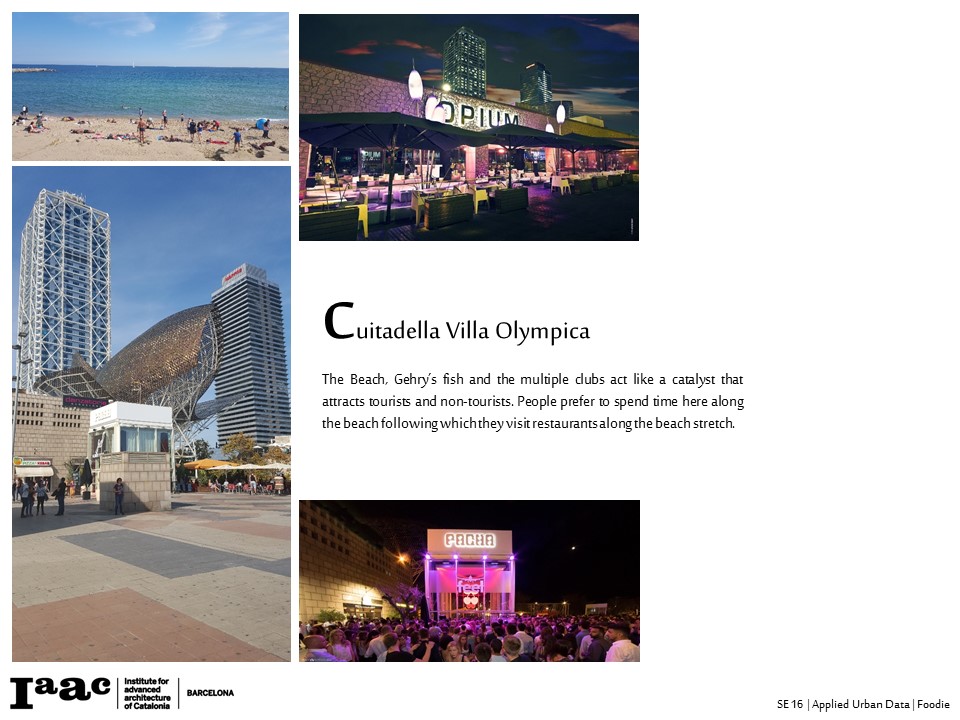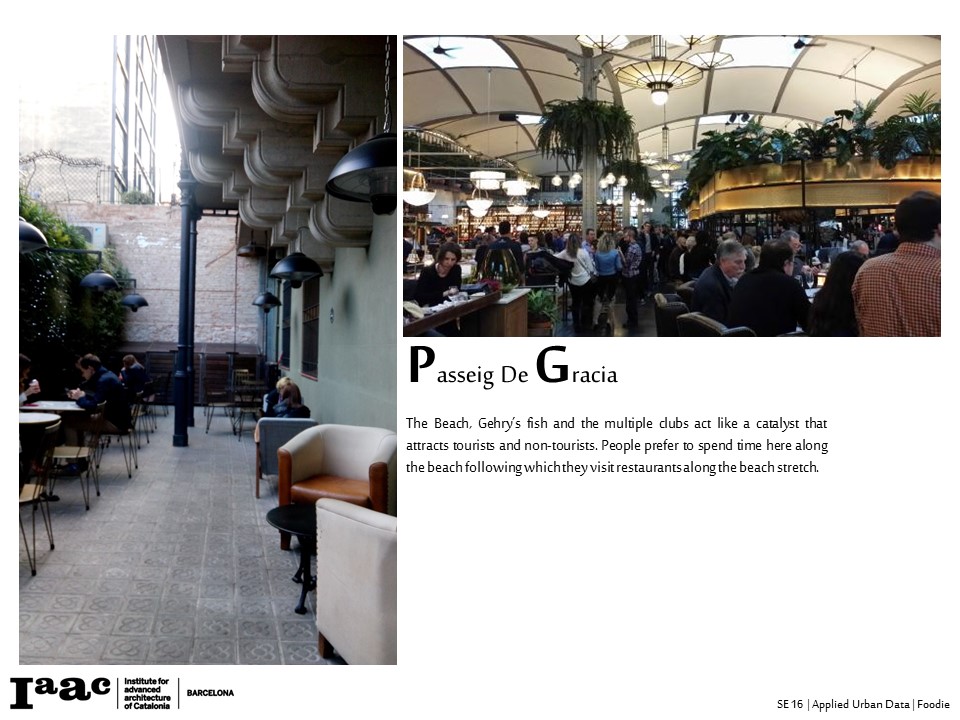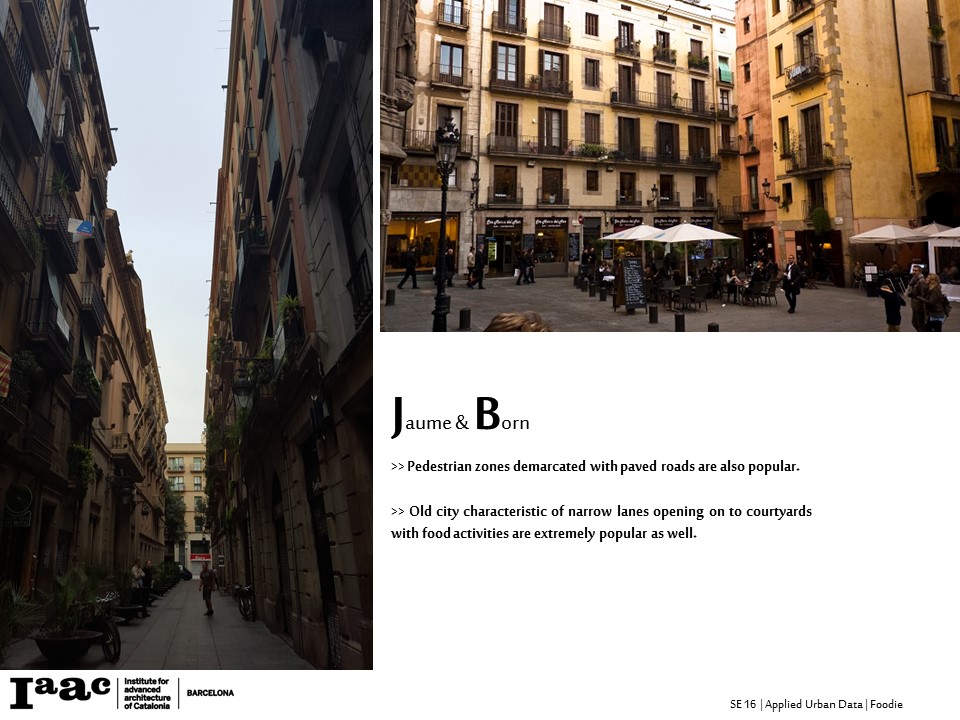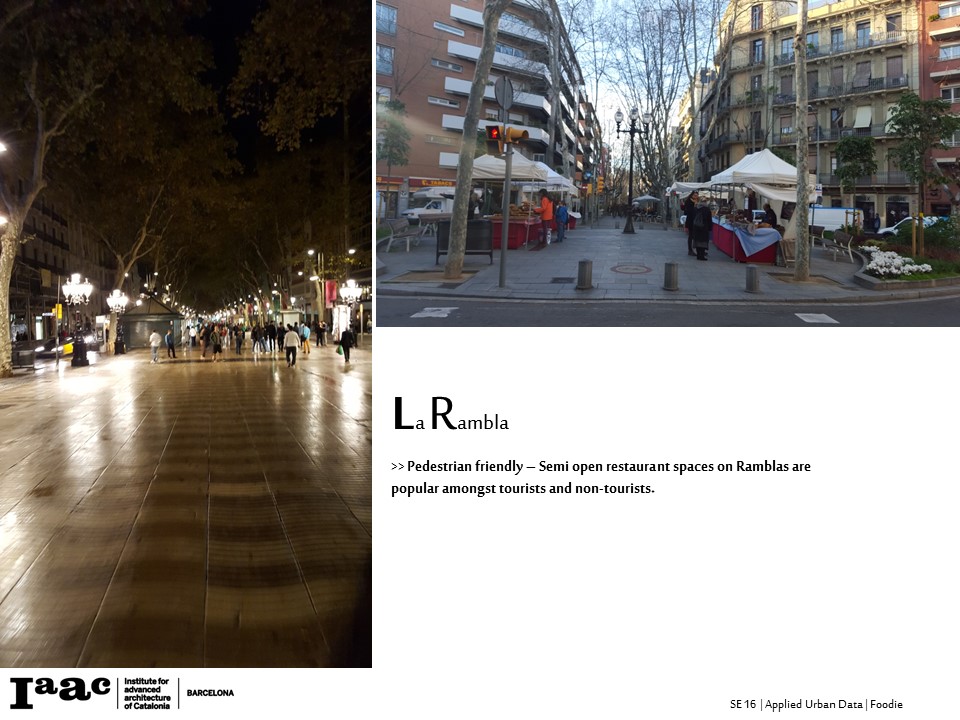Foodie deals with the behavioral patterns of tourists and non-tourists in Barcelona so as to derive urban scale references for the city’s future development.
Students :
Mohit Chordia
Prajakta Panchal
Sahana Sridhar
Tutors :
Mar Santamaria
Pablo Martinez
Barcelona is a popular tourist attraction today. The Ramblas, Sagrada Familia, Olimpic Stadium and the beaches are amongst the popular places to visit. Apart from the beach and architecture, it is possible to understand behaviors of tourists and locals through food. A series of maps are generated to compare the locations and time of tourists and non – tourists, whose tweets relate to restaurants and drinks. By studying densities, overlaps, etc., the behavioral patterns could be derived to be used in future urban scale design schemes.

Restaurants in Barcelona

Restaurants with tourists and non- tourists

Restaurants with tourists and non- tourists at lunch time

Restaurants with tourists and non- tourists at dinner time

Paella

Tourists and non-tourists tweeting Paella

Tourists and non-tourists tweeting Paella at lunch

Tourists and non-tourists tweeting Paella at dinner

Sangria

Tourists and non-tourists tweeting Sangria

Tourists and non-tourists tweeting Sangria at lunch

Tourists and non-tourists tweeting Sangria at dinner
As a comparison between these maps, it can be observed that while the tourists and non tourists choose different locations to have food, there is a distinct overlap between the places where they choose to drink. These places could be potential places where tourists and non tourists interact.
Codes used to derive various Maps

Queries for different maps
Anslysis from the Maps

Analysis – Restaurants and Hotels

Hotels in Barcelona

Hotels in Barcelona
The inter city highway going through Barcelona has hotels with a considerably lower rate for accommodation, which is why a lot of tourists can be seen tweeting from this area. Whereas, towards the inner parts of the city, the rates of the hotels are higher, and hence lesser tourists can be seen.
Our analysis is further divided into two parts –
- Spotting the major tourists attractions in the city
- Spotting the pedestrian friendly streets of the city
Places with tourist attractions like the beaches of Barceloneta and Ciutadella, Sagrada Familia and Gaudi structures of Passeig de Gracia act as major catalysts for tourists and non-tourists, which is why a lot of tweets can be observed in these area of the city. These catalysts attract the tourists and non tourists towards the restaurants and bars around them.

Barceloneta beach – tourist attraction

Barceloneta

Ciutadella – Vila Olimpica – Tourist attraction

Sagrada Familia – Tourist attraction

Passeig de Gracia – Tourist attraction
Pedestrian Friendly Places like Jaume and Born, and the Ramblas attract tourists and non- tourists mainly because of the planning and design characteristics of paved seating areas, vehicular free streets, shopping kiosks and narrow lanes that open into vehicular free courtyards.

Jaume and Born – Pedestrian friendly

La Rambla – Pedestrian friendly
Design Proposal
Based on the examples of Barceloneta, Cuitadella Vila Olympica, Jaume, etc, we understand that tourists mainly visit places that either have some attraction points or areas that are pedestrian friendly in terms of design.
A lot of potential places for developing pedestrian zones can be spotted in Bac de Roda rambla, Gothic Ramble, Diagonal Rambla, etc. These places are currently dominated with vehicular traffic, but there is scope to introduce pedestrian zones in these area. This data gives a very clear overview of tourist and non- tourist zones.

Potential pedestrian friendly streets
‘The design characteristics of the tourist attractions and current pedestrian friendly zones could be replicated in other parts of the city in order to decentralize tourist zones and to scatter it all through the city in order to create a balance.’